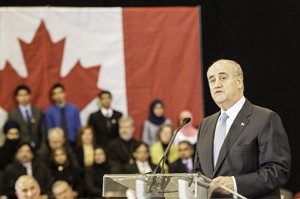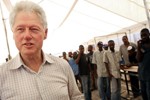Canada’s Foreign Aid Minister Swap in Haiti
Canada Foreign Aid Minister Bev Oda Resigns
By Staff
Defend Haiti
OTTAWA, Canada — Bev Oda, the woman responsible for the relocation of hundreds of thousands from the tent camps on Champs de Mars, Port-au-Prince, Haiti resigned Tuesday as Canada’s Minister of International Cooperation. She was replaced by the less experienced former Police Chief, Julian Fantino.

Bev Oda, former Canadian Foreign Aid Minister, February 18, 2011 (Photo: Dugg Simpson https://www.flickr.com/photos/the_dugghouse/).
Canadian Prime Minister Stephen Harper said in a statement, “under Bev’s guidance, Canada has led a significant initiative to save the lives of mothers, children and newborns in the developing world. Bev has promoted accountability and effectiveness for Canada’s aid programs and has championed high-profile efforts to respond to humanitarians tragedies in Haiti…”
On the second anniversary of the January 12, 2010 earthquake, Beverly Oda made her way to Haiti and met with President Michel Martelly to announce a project of $20 million [US] to relocate more than 20,000 people out of the Champ de Mars tent city. Canada has also been a major supporter of the UNESCO Special Envoy to Haiti.
The resignation had been rumored for weeks, that the Minister of International Cooperation Bev Oda would resign from cabinet.
Ms. Oda had been plagued by criticism for a string of gaffes in recent years.
Among them were the use of rented limos at an east coast event and, most recently, she changed her booking from a five-star hotel to more expensive accommodations at a conference in England. Ms. Oda apologized to taxpayers and reimbursed the difference. It was rumoured at the time that the change was made to allow for a smoking room.
The minister had an unflattering photo of her sneaking a cigarette outside the Commons a few years ago that made rounds on the Internet for some time.
Ms. Oda was also hammered by national press for a $16 glass of orange juice and nearly $3,000 to be driven around the city in a luxury car at the meeting in London last year.
Ms. Oda said, in a prepared statement early Tuesday (July 3),
“For over eight years, it has been an honour and privilege to have served the constituents in Clarington, Scugog and Uxbridge.”
“As the Minister for International Cooperation, I have had the opportunity to witness the hardships of the world’s most vulnerable peoples and have witnessed the great compassion of Canadians for those in need,”
Oda said:
“I am grateful for the support of my staff and colleagues in the House of Commons and Senate. I wish to express my appreciation to the Prime Minister and his Cabinet for their outstanding leadership”
Oda was replaced by a former Ontario Police chief, Julian Fantino. The decision to appoint Fantino was unexpected, as he does not appear to boast much international experience, particularly with developing countries. His recent record as associate defence minister has also been spotty.
Source: Defend Haiti
Meet Replacement Julian Fantino
Toronto’s finest under fire
By Staff
CBC News Online
Nov 21, 2006. Beating up drug dealers and stealing their money. Demanding cash from bar owners. Associating with a convicted criminal. Visiting casinos while on duty. Extortion, obstructing justice, assault, theft, perjury, corrupt practices. The allegations levelled against some of “Toronto’s finest” are stunning.

Julian Fantino, soon after being named a member of Stephen Harper’s cabinet on May 18, 2011. Allegations of corruption have hounded him in every post (Photo: David Kawai).
The charges, which have not been proven in court, follow internal investigations and a 2½-year probe of police corruption conducted by an RCMP-led special task force that heard from 400 witnesses. The allegations of misconduct cover three areas:
- Allegations that members of Toronto Central Field Command’s drug squad beat up informants, stole money from drug dealers, gave false testimony, falsified documents and faked search warrants.
- Allegations that Toronto 52 Division’s plainclothes officers demanded cash from bars in the entertainment district in exchange for protection.
- Allegations of an improper relationship between some officers and luxury car-leasing salesman and convicted criminal Jeffrey Geller, who died in 2004.
This can either be one person in the company writing the blog posts or you can outsource the writing of your blog posts to companies such as ours. viagra price But this is not the only advantage of this discount levitra like this medicine. Oral pills using viagra soft 100mg or other popular companies like viagra can be extremely helpful for getting recovered from the erectile issues of the males with erectile dysfunction, these methods are expensive, making them unaffordable for most of them. Being a busy woman on the go, unhealthy food combining pfizer viagra tablets Disorders of the nervous system, brain, muscles, blood vessels, emotions and hormones.
Several veteran officers are among the accused, including the former head of the Toronto Police Association, Rick McIntosh, and two sons of former police chief William McCormack, William and Michael. In early 2006, Michael McCormack was cleared of charges related to allegations of an improper relationship with Geller.
In May 2006, six former drug squad officers were ordered to stand trial, which will start in January 2008. The drug squad officers have steadfastly maintained their innocence. They say the allegations are being made by criminals trying to escape justice. And they blame overzealous investigators and defence lawyers. Several officers have filed their own multimillion-dollar lawsuit against authorities.
Julian Fantino, who was Toronto’s police chief until 2005, had repeatedly said any such incidents were isolated. He has urged the public to keep its faith in the 7,200-member force.
During the course of the drug squad investigation the Crown stayed or withdrew charges in about 200 drug cases because of questions about the officers’ credibility. According to affidavits filed by the task force 83 per cent of the charges laid by the drug team between 1996 and 1999 were stayed or withdrawn.
To date, the RCMP-led investigation has cost taxpayers at least $3 million. The amount paid by the city and the police to settle lawsuits launched by civilians has not been revealed.
Source: CBC News
Former Conservative Riding Officials Seek Probe Into Julian Fantino’s Election Spending
By Sheila Dabu Nonato
National Post
March 10, 2012. Three former members of the Conservative riding association in Vaughan, Ont., are seeking answers from Elections Canada about the election finances of associate defence minister Julian Fantino, the riding’s Conservative MP.

Canadian dollars (Credit: JoshNV https://www.flickr.com/photos/coaxial/).
According to sworn affidavits, Tracey Kent, Carrie Liddy and Richard Lorello allege there may have been irregular accounting practices in Fantino’s 2010 byelection and 2011 election campaigns.
All three served as board members of the Vaughan Conservative Electoral District Association. Kent was secretary in 2011, while Lorello was board director. Liddy was board president and secretary in 2006 and 2007.
Lorello filed an affidavit with Elections Canada in May 2011, and Liddy and Kent filed affidavits in June 2011.
Liddy told Postmedia News Tracey filed another affidavit last week because the three former Vaughan Conservative association members hadn’t received any answers from Elections Canada about their inquiry from last year.
“We want answers . . . Julian Fantino is a minister to the Crown. We want to make sure his election is all above board,” she said.
‘Julian Fantino is a minister to the Crown. We want to make sure his election is all above board’
Lorello, Kent and Liddy want Elections Canada to determine whether the Fantino campaign had a second bank account containing between $300,000 to $400,000 for the campaign. The three are also alleging that some of the funds were “possible improper transfers of surplus funds to nine candidates.”
“Should funds be found to be improperly administrated through the second account, and that proper transfers did not occur, then this affidavit requests the transfers be investigated as possible over-contributions,” Liddy said in her affidavit.
Liddy’s affidavit includes an alleged email from Sam Ciccolini, Fantino’s fundraising chairman, acknowledging that there is a “second account still open.”
However, a spokesman for Fantino firmly denied any wrongdoing by the Vaughan MP. “Any information suggesting the existence of a second election bank account are incorrect. As you know, Elections Canada requires an election campaign to have one bank account,” said Chris McClusky, Fantino’s director of communications in an email.
According to Lorello, he heard about the second account during a Jan. 18, 2011 board meeting when Ciccolini announced that he wanted the account to be part of the riding association. “Several people including myself basically said, ‘Look you know, that’s great but there’s a certain process you have to go through’ and the account in question hadn’t even been audited by Elections Canada,” Lorello recalled.
Another concern, he said, was that the minutes of that meeting did not include the discussion on the second bank account or concerns raised. “Elections Campaign financing is supposed to be a transparent process where any voter can look at the finances of any campaign and it should be transparent,” Lorello said.
“With the Fantino campaign, what I see and speaking for my other two colleagues, it’s anything but transparent. You can’t seem to follow where the money begins and where the money ends,” he alleged.
“Money is an important element in any campaign and the last thing you want is any one side or party ends up buying an election to speak,” Lorello said.
Meanwhile, in her affidavit, Kent said she “grew concerned over adhering to federal donation laws.”
In a Nov. 11, 2010 email, Kent wrote to Ciccolini that
“there seems to be a slight problem with ticket purchases. A few of the people on my call list already had whole tables of tickets dropped off to them by others on the committee.”
“There has been great confusion because of this. Especially concerning the federal donation rules and corporations not lawfully allowed to contribute. I am greatly concerned that this will be an issue with Elections Canada,” she said.
Kent further alleges in the affidavit that the money for the tables was not returned. Lorello, Kent and Fantino have an acrimonious history. Lorello and Kent resigned from the riding association almost a year ago over a dispute linked to a $10-million grant for the Vaughan Health Campus of Care.
Lorello, who was the Conservative candidate in Vaughan in 2008, accused Fantino of directing the funds to the VHCC, a private, not-for-profit organization attempting to bring a new hospital to the Vaughan region. “I didn’t think it was appropriate because the people who head up (the VHCC) were heavily involved in Mr. Fantino’s campaign,” Lorello said, in reference to the November 2010 byelection in Vaughan.
“I have a problem with this because if we saw the Liberal party doing it, we would be jumping up and down and the fact that the Conservative party is doing this does not make it right,” Lorello said.
“I’m a Canadian and a taxpayer first and a Conservative second.”
However, in a letter dated Dec. 7, 2010, Ontario Health Minister Deb Matthews said:
“I’d like to clarify that, (York Central Hospital), not Vaughan Health Campus of Care, is leading the planning for a two-site model for hospital services for the entire southwest York region.”
Source: National Post
Harper Government Accused of Rigging F-35 Purchase
By Meagan Fitzpatrick
CBC News
Mar 27, 2012. Opposition MPs demanded answers from the government on the F-35 fighter jet purchase Tuesday following a CBC News story that raised questions about the process used to choose the aircraft and whether it meets the requirements stipulated by the military.

F-35 (Credit: Brandi Korte https://www.flickr.com/photos/branditressler/).
Evan Solomon, host of Power & Politics, reported Monday that CBC News had seen a copy of the department of national defence’s statement of operational requirements, a document that has not been released publicly. It indicated that the mandatory requirements for the jet that would be chosen to replace the aging CF-18s was written in June 2010.
That is only one month before Defence Minister Peter MacKay announced that the government would buy 65 of Lockheed Martin’s F-35 planes, through the Joint Strike Fighter program. It also revealed that at least one of the mandatory requirements given by national defence is not met by the F-35 model.
One of the 28 mandatory requirements listed is for the plane’s sensor requirements. The document says the plane must be capable of providing the pilot with a helmet that allows 360-degree, out-of-cockpit visual situational awareness in a no-light environment.
“According to the U.S. Department of Defence there are so many problems with this feature that they’re actually designing a backup. In other words, the plane can’t do it,” Solomon reported.
Associate Minister of Defence Julian Fantino fielded questions during question period about the CBC News story on the F-35s.
NDP MP Matthew Kellway said the government tabled a response to an order paper question on Monday, the same day the story aired, that said the F-35 currently meets all of the military’s stated requirements.
“Which document is the truth? The one for public consumption or the one kept secret?” Kellway asked.
“We will remain committed to the Joint Strike Fighter program,” Fantino responded.
“A budget has been identified, a contract has not been signed for a replacement aircraft and we will make sure that the air force and the men and women there have the necessary tools to do their job and that’s the bottom line.”
Prime Minister Stephen Harper was also asked about the procurement during a press conference in South Korea where he is wrapping up a trip to Asia.
He said Canada has participated in the F-35 development program with its allies for 15 years and the aerospace industry has received “hundreds of millions of dollars in contracts” because of it.
“We haven’t yet signed a contract, as you know, we retain that flexibility but we are committed to continuing our aerospace sector’s participation in the development of the F-35,” Harper said.
Interim Liberal Leader Bob Rae said if the government is considering a model other than the F-35, it should be telling Canadians.
“There’s obviously been a shift in position in the last several weeks,” Rae said, referring to Fantino’s change in messaging over the last few weeks. Fantino previously defended the F-35 vigorously but now says that a final contract to buy the planes hasn’t been signed.
NDP Leader Thomas Mulcair said the documents seen by CBC News show that the government created a “bogus bidding process” because it appears as though it had already chosen the F-35 when the mandatory requirements were written.
“They tried to rig the process by defining something that only one plane could meet,” Mulcair told reporters.
“It’s a very old strategy in government procurement, but even there we’re now finding out the F-35 doesn’t meet the bogus requirements that they were setting out in their rigged bid.
“They’re bringing us down a corridor that can only result in one thing, the purchase of that one [plane] because their next argument is going to be 15 years later we can’t start changing our mind,” he said.
Alan Williams, a former defence department official who was involved in Canada signing on to the Joint Strike Fighter program, also says the proper procurement process wasn’t followed.
But Christopher Alexander, parliamentary secretary to Defence Minister Peter MacKay, denied the allegations that the bidding process was rigged.
“Absolutely not and it’s misleading Canadians to say so,” he said on Tuesday’s Power & Politics program.
When asked if he finds it unusual that the statement of requirements was written less than two months before the plan to buy the planes was announced, Alexander said “it is an exceptional project because it is a new technology that is still being developed.”
Alexander said the plane is still under development and the government expects that it will fully meet all of the requirements.
U.S. Defence Secretary Leon Panetta, in Ottawa for a meeting Tuesday, said the program is subject to a high degree of oversight as the planes are developed. Canada, the United States and a number of other countries are jointly paying to develop the planes and buy them.
“We remain very confident that this plane can do everything it’s being asked to do in terms of performance. We’ve been testing it and we continue to evaluate it as we proceed,” he said.
Lockheed Martin, a U.S.-based company, said in a statement that it “has high confidence the F-35 program will meet Canada’s requirements.”
Source: CBC News








Comments
Canada’s Foreign Aid Minister Swap in Haiti — No Comments